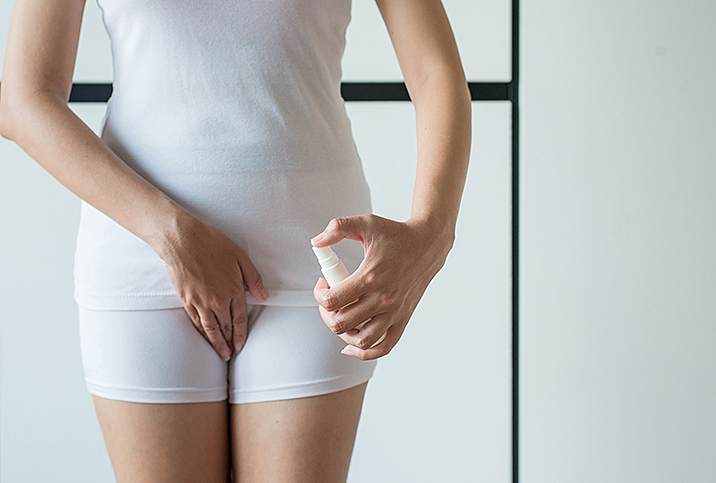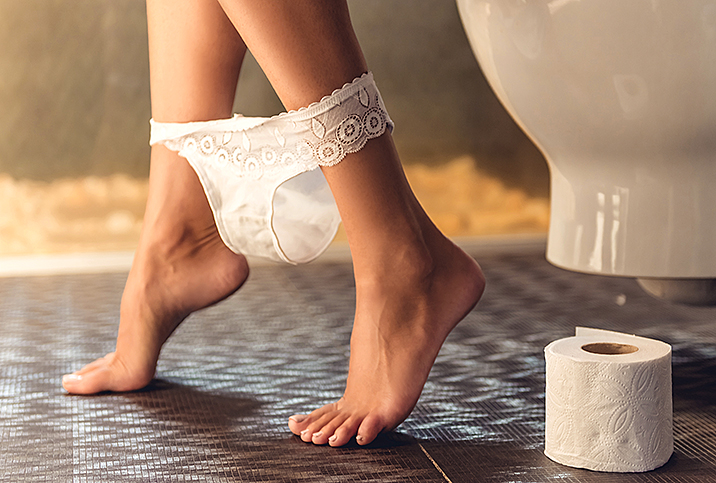WTF Are Vaginal Deodorants (and Do They Work)?

If you suffer from recurrent bacterial vaginosis or have a strong body odor, intimate deodorant can be a solution to neutralize the bad smell of your genital area.
What causes that bad smell?
The vagina is rich in apocrine glands, which produce a different sweat than the rest of the body and has its own scent. However, the smell of a healthy vagina is nothing to be ashamed of as it's a sign of good hygiene and is completely normal.
If you artificially mask the natural scent of your genital area with products, you may miss a change in smell that could indicate an infection, which could add time to discovery, treatment and recovery. Here are some causes of a strong odor from your genital area:
Bacterial vaginosis
The vaginal flora is made up of lactobacilli and other kinds of bacteria, all of which have the dual function of maintaining the pH of the vaginal mucosa and protecting against possible infections.
If the delicate balance of bacteria is broken, this could result in bacterial vaginosis and one of its more obvious characteristics, a pungent smell.
Yeast infections and STIs/STDs
Also known as candidiasis, a yeast infection happens as a consequence of an alteration in the vaginal flora and also causes a distinct scent.
Additionally, sexually transmitted diseases (STDs) and sexually transmitted infections can exhibit strong vaginal odors.
Hygiene and clothing
By not washing enough or using inappropriate or aggressive soaps, the vaginal microbiota can alter, resulting in an infection. Tight-fitting and synthetic clothing can also increase the normal perspiration of the genital area, which allows the proliferation of odor-causing bacteria.
Menstruation
Vaginal odor changes throughout the menstrual cycle in a way that can be perceived with greater or less intensity, depending on the day of the month.
If your intimate areas don't smell good
Faced with an intense odor from the genital area, your first response should not be to reach for a vaginal deodorant. First, set up an appointment to see your gynecologist in order to rule out possible infection or receive treatment if one is diagnosed.
In addition, talk to your gynecologist about habits you can incorporate into your daily regimen that will help you avoid infections, such as:
- Use underwear made of natural fabrics.
- Change underwear every day or more if you sense that it is damp.
- Wash thoroughly after having sex.
- Avoid both excess or a lack of hygiene.
- Carry out extreme hygiene habits during menstruation.
- Dry off well after urinating.
What's inside the deodorant and how does it work?
Most vaginal deodorants do not use perfume at all but instead include ingredients designed to neutralize the bacteria causing bad smells. Look for some of the following:
- Neem oil has antiparasitic properties and is often used in lice treatments.
- Aloe vera gel moisturizes irritated mucous membranes and promotes healing.
- Cyclodextrins are oligosaccharides derived from corn starch that neutralize the volatile compounds responsible for bad odors by trapping them in their structure.
- Lactic acid neutralizes bad smells by regulating the pH to physiological levels, thus preserving the balance of the vaginal flora.
- Grapefruit seed extract carries out a powerful antibacterial action on the bacteria that causes bad odors but does not damage your physiological bacterial flora.
The verdict on vaginal deodorants
Most health professionals do not recommend the use of intimate deodorants for feminine hygiene. Gynecologists and experts recommend that vaginal deodorants should not be used as a first line of defense against intimate smells and a doctor's visit should be a priority to make sure the odor is not indicative of an infection or worse.
The risk of using deodorants is they can irritate—cause itching, stinging and facilitate some infections, such as yeast infections—and worse, they can change the pH of the vagina. The female genital area is very sensitive, and therefore it is better not to expose it to unnecessary irritants.
Don't mistake the distinctive scents of a healthy vagina for something you should be ashamed of. We're human, we perspire, we discharge and we pass gas. It's all part of having a body that's running as it should.


















